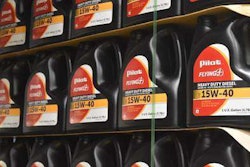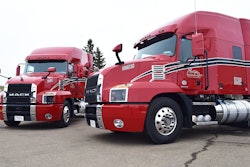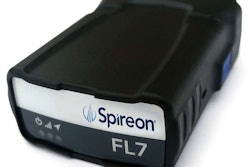 The Celadon Group has rolled out a strategic platform that connects all departments with customer service activities.
The Celadon Group has rolled out a strategic platform that connects all departments with customer service activities.The metrics transportation companies use for customer service are typically given to them by shippers. These scorecard metrics range from load acceptance rates to on-time percentages, and damage-free deliveries.
Motor carriers and third-party logistics providers are using new technology to move beyond scorecard metrics to more quickly respond to customer needs and business opportunities.
Central to this effort are systems that unify their activities in sales, pricing, operations, driver workflow and other areas to manage the overall customer experience.
Death of a salesman?
Transportation companies have many different beehives of activity. To coordinate activities of all departments and deliver a better customer experience, the Celadon Group implemented a strategic Unified Communication Platform (UCP).
The goal for the project is giving users in every department “one single pane of glass” to manage interactions with customers and employees, says Mike Gabbei, chief information officer of the Indianapolis-based truckload carrier.
Starting last year, Celadon’s UCP platform strategy moved users from Lotus Notes to Office 365 for email; from Zeacom to Genesys for Contact Center operations; and from Oracle to Salesforce for customer relationship management (CRM), he says.
The rollout of Salesforce began in Celadon’s customer service department earlier this year. Celadon organizes its customers into commodity sectors such as food and beverage, automotive, manufacturing and retail.
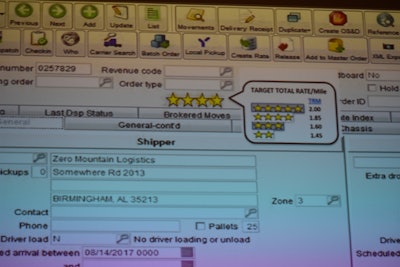 McLeod Software is developing a 5-star rating system for loads using data science.
McLeod Software is developing a 5-star rating system for loads using data science.With the Salesforce CRM system, all of its customer support interactions — emails, phone calls, etc. — in each commodity are organized into “cases.” This feature in Salesforce helps to spread out the work among its customer service representatives (CSRs).
The CSRs in each commodity use a shared email box for visibility of customer service activities. With shared visibility, Celadon customers “never have to worry about sending a personal email to someone on vacation,” says Brett Terchila, senior vice president of customer service.
Celadon also tracks CSR’s reaction time to cases and their activities for growing accounts.
Celadon uses software from Manhattan Associates that gives CSRs real-time guidance on soliciting loads. The technology uses historical shipping patterns and scores present and future loads with a forward-yield calculation. This calculation factors in network balance and load profitability, he explains.
“If CSRs have capacity they need to book to it,” he says.
The Salesforce platform tracks data from Manhattan to measure CSRs according to the loads they accept, decline and solicit.
End-to-end visibility
Rather than invest in stand-alone CRM systems, many transportation companies use a complimentary suite of products that integrate with transportation management software (TMS) systems.
McLeod Software offers a CRM module for its LoadMaster and PowerBroker TMS systems used by asset and non-asset transportation companies. With the CRM module, users can plan and execute sales and marketing campaigns for their prospective and existing customers, says Chris Callahan in McLeod’s sales services department.
 Trimble Transportation offers a suite of integrated products for CRM functions. Show here is the opening session of its in.sight user conference in Houston, Sept. 9-12
Trimble Transportation offers a suite of integrated products for CRM functions. Show here is the opening session of its in.sight user conference in Houston, Sept. 9-12Company executives can create a marketing plan for sales reps and CSRs by viewing past orders, revenue and other customer data in the system. Once a plan is created, the software tracks the daily execution of the plan in terms of phone calls, emails and other sales activity to convert prospective business into sales.
Reports that chart the progress of marketing campaigns against goals are visualized using the module’s CRM Vital Signs feature, he says.
McLeod also offers a number of analysis and business intelligence tools to monitor customer profitability. It currently is developing a real-time predictive scoring system for orders in the LoadMaster platform to give carriers a simple way to evaluate the “forward profitability” or yield of each order.
The new scoring system will use a 5-star rating for each load. By clicking on the score, users can view reports that detail what they can do, in terms of network load planning, rate negotiations and other activities, to increase the score, says Randy Seals, customer advocate at McLeod Software.
Trimble Transportation Enterprise, the new branding of Trimble-owned company TMW Systems, offers a suite of integrated products for end-to-end CRM functions.
Monica McCool, big data product manager for Trimble Transportation, says the integrated products in the company’s Enterprise and Mobility divisions leverage data and insights to “allow our customers to make better decisions.”
A carrier’s sales team, for instance, can use Trimble products that analyze network balance and forward yield. Operations personnel can monitor work in progress to ensure on-time arrivals with integration between the TMS and fleet mobility systems automating shipment ETA status updates.
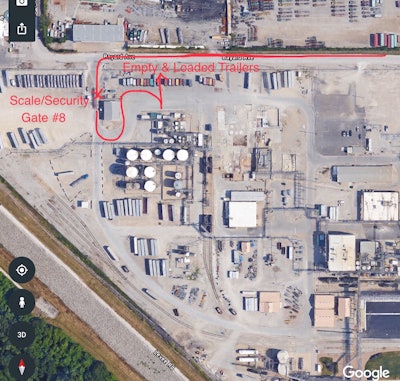 By using the DeliveRecon mobile app, drivers for Liquid Trucking update information on customer sites.
By using the DeliveRecon mobile app, drivers for Liquid Trucking update information on customer sites.Business intelligence tools can provide the end-to-end visibility of customer service metrics to all departments, who work collectively to correct problems before the customer experiences them, she says.
Trimble’s business intelligence tools can also be used to score customer profitability on the basis of revenue per hour, profit margin, dwell time, contract compliance and other data points.
“We see business intelligence tying it all together and providing a platform for collaboration,” she says.
Trimble Transportation has an online tool that carriers and 3pls can use as their “playbook” for responding to bid packages and RFPs they receive from shippers. The tool, Engage.Bid, has a workflow for users to receive RFPs from shippers, customize bid packages and submit completed RFPs through a direct connection, explains Scott Minton, senior value engineer for Trimble Transportation.
“We built a more comfortable, informative environment to help with the heavy lifting of the bid season,” he says.
Engaging drivers
Any strategy to improve the customer experience may seem incomplete without getting the right information to drivers to make error-free pickups and deliveries.
With a location-based mobile app and cloud platform, Liquid Trucking is gathering CRM data while rewarding drivers for their reconnaissance efforts.
The mobile technology originally was developed by the Plattsmouth, Neb.-based tank carrier, whose owners formed Epic Ideas as a separate company to develop a commercial version of the technology, called DeliveRecon. Epic Ideas partnered with a third-party software firm to launch the commercial offering.
Liquid Trucking fully deployed DeliveRecon in early 2018 to service customers with agricultural, food grade and hazmat shipments. With the app, drivers have become “an extension of our customer service department,” says Jason Eisenman, director of human resources for Liquid Trucking.
The company rewards drivers for sharing their knowledge and experiences at customer pickup and delivery sites. Drivers can update addresses, phone numbers and record instructions — such as how to pull in, where to park empty trailers, etc. — by adding text and by capturing and editing photos, videos and audio clips.
Fleet management can further edit and approve information captured by drivers before sharing it with other drivers. When drivers approach a site, they can tap a “Near Me” function in the app to view nearby customer locations and site-specific instructions.
Year over year, Liquid Trucking has seen a 46 percent reduction in incidents, such as spills, and accidents since it deployed the technology in early 2018, he says. The reduction can’t all be attributed to DeliveRecon, but it “certainly is playing a big role,” says Eisenman, who is also chief executive of Epic Ideas.
In 2018, more than 100 of the company’s 150 drivers have updated site information on more than 1,400 locations, he adds.
With strategic investments in technology, transportation companies are now able to manage the customer experience, end-to-end, to more quickly and effectively respond to new business opportunities.


